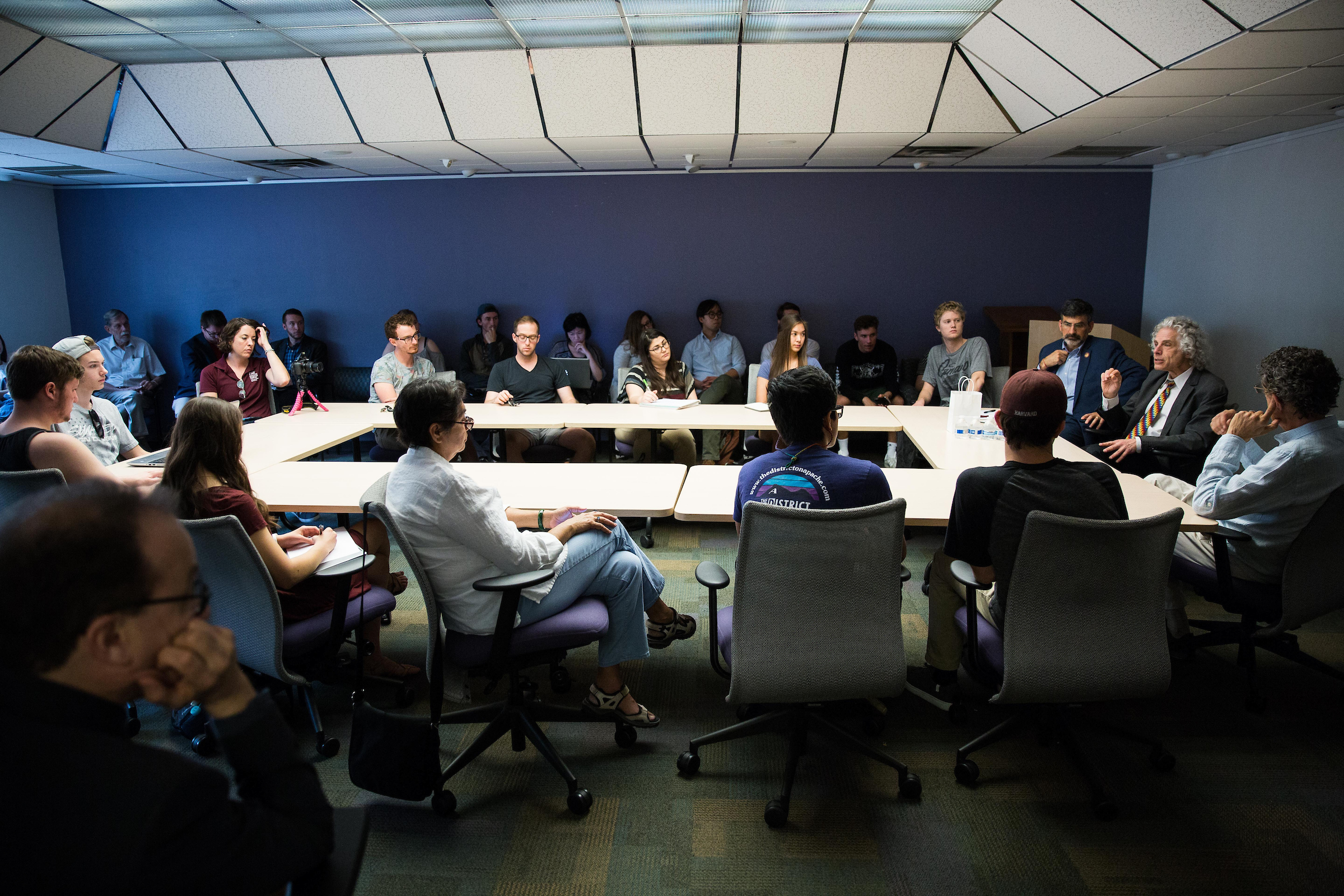Steven Pinker has a message for all those standing at the ready, poised to raise the doomsday alarm at a moment’s notice: Not so fast.
In his new book, “Enlightenment Now” (which Bill Gates has declared his “favorite book of all time”), the Harvard professor of psychology uses social science data to make the argument that we are actually living in the most peaceful, progressive time in human history.
On Wednesday afternoon, Pinker fielded questions from a group of about 30 ASU students in an open discussion on the Tempe campus that included such topics as religion, politics and technology.
“Almost anything that you measure when it comes to human well-being has increased over time,” Pinker told students, citing life expectancy, general health, time for leisure, rates of literacy and access to food, among other measures.
Pinker was in town to deliver the final public talk in the School of Civic and Economic Thought and Leadership’s “Free Speech and Intellectual Diversity in Higher Education and American Society” 2017–2018 seriesThe School of Civic and Economic Thought and Leadership’s “Free Speech and Intellectual Diversity in Higher Education and American Society” series is co-sponsored by the Walter Cronkite School of Journalism and Mass Communication and the Sandra Day O’Connor College of Law., which he gave later Wednesday evening at Old Main’s Carson Ballroom.
Video by Jamie Ell/ASU Now
Over the course of the academic year, the series featured such speakers as fellow social psychologist Jonathan Haidt, Middlebury College Professor of international politics and economics Allison Stanger and University of Chicago law Professor Geoffrey Stone, who all spoke on the urgent need to embrace free speech and diverse thought on college campuses and in society in general.
“It’s been a terrific yearlong series,” said Paul Carrese, School of Civic and Economic Thought and Leadership professor and founding director. “We’ve welcomed well over 3,000 people to these events since September … and we’ve had a wide range of views represented by people from multiple disciplines and life experiences.
“We’re delighted to have [Pinker] as the final, cleanup hitter.”
The first question lobbed at Pinker during the afternoon discussion was no softball — "What role do you feel religion plays in humanity’s future?" — and he held nothing back when he swung at it.
“I don’t think there’s a role for belief in a deity,” because there’s no evidence of one existing, he said.
Harvard Professor Steven Pinker wasn't afraid to tackle hard questions posed by ASU students during an open discussion on the Tempe campus Wednesday afternoon. Photo by Deanna Dent/ASU Now
The belief in gods, souls and spirits does nothing to enhance humanity, Pinker argued. Instead, holding out for an afterlife only serves to devalue our lives on Earth. And though he conceded that many religions nowadays have become more humanistic and social justice-oriented, the belief in a benevolent, omnipotent being can lead to inaction on issues like climate change (if the understanding is that said being would never let humans suffer as the Earth withers away) and dangerous misinterpretations of perceived sacred texts.
“If we want to make humans better off, we have to do it ourselves,” Pinker said. “Prayers aren’t going to do it. … That’s why I think humanism combined with science and reason is the most moral set of beliefs.”
When it came to that other most-avoided topic of polite conversation — politics — Pinker’s stance was just as firm.
“We’d be better off if policy questions were not treated as matters of tribal loyalty,” he said. “There are an awful lot of scientists who take a more global approach to [political issues] — we could use more of them. … Decoupling particular ideas from political ideologies is absolutely essential” to progress.
Pinker referenced the chapter on reason in “Enlightenment Now,” in which he addresses the scientific community’s complaint that many people reject scientific findings because of a lack of education.
“The actual studies on why that happens show that [the stances people take on certain issues are] simply identity badges for belonging to a particular ideological tribe,” he said. “On average, people who advocate for climate change don’t know any more science than those who deny it.”
Social psychology graduate student Adi Wiezel enjoyed listening to Pinker’s insights.
“It was interesting to hear how different threats, or perceived threats, can affect political attitudes,” she said.
Pinker left students with the notion that just because some things may appear to be in dire straits, it does not mean all hope is lost.
“It’s a misunderstanding of progress to think that everything always has to get better. That would be magic.” Instead, he said, “If we apply knowledge, science and reason to the goal of making people better off, we can succeed. And we have succeeded.”
Top photo: Steven Pinker answers questions about his books and his thoughts on free speech and human progress during a Q&A session with students, faculty and staff on the Tempe campus Wednesday afternoon. Photo by Deanna Dent/ASU Now
More Law, journalism and politics

When police moonlight, who’s watching?
When police officers work off-duty security jobs, or “moonlight,” often in uniform and sometimes with full police powers, the lines between public service and private interest can blur.A new…

Arizona tax changes this year: What to know
Let’s face it: Tax season is rarely anyone’s favorite time of year. And this time around, there’s an added wrinkle as Arizona’s tax code is in flux.Arizona lawmakers are debating which of the recent…

ASU course inspires students from different majors to engage with government
On a brisk January morning, about 50 students file into a classroom on Arizona State University's Downtown Phoenix campus. Many of the students are majoring in journalism or nursing but they are…

